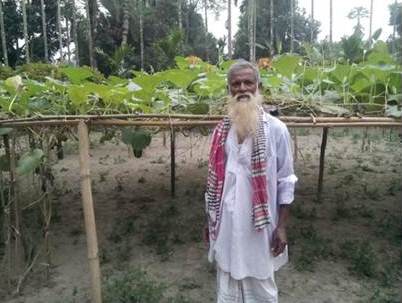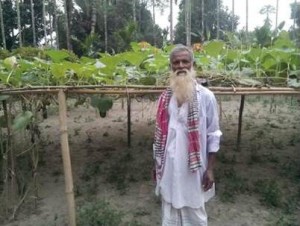Farmer Md. Ibrahim Miya lives in the district of Manikganj. Staying in the village of Nayabari in Singayr, he earns a living from agriculture and has been witnessing various changes in this particular sector of the economy for quite some time. He saw how organic farming was replaced by its commercial version, how farmers were sidelined from farming, how farming materials, particularly seeds were seized by companies – witnessing everything hands-on. Unable to make any headway in farming, Ibrahim had tried his luck overseas. However, the motherland’s attraction pulled him towards farming again in Bangladesh. Now, in an exclusive interview to barciknews.com, he has upheld his life and the vital importance of organic farming. Shimul Kumar Biswas of barciknews.com shares the story of farmer Ibrahim Mian for our readers
barciknews.com: Hello, how are you?
Ibrahim Mian: I am well, thank you.
b: So, what are you doing now?
I: Farming
b: Could you tell us anything about your past life?
I: Yes, of course. My house was washed away by the Dhaleshwari river. My father had built another one to house me and my 8 siblings- a brother and 7 sisters. With a family so large, food was understandably scarce. So, I took to farming at a very young age to make ends meet. I harvested crops, worked in bridge piling and even at brick factories. I also went to Iraq and Saudi Arabia for work.
b: Can you tell us how your life has changed in the past year?
I: Listen, I am a simple farmer. My life is entirely based on farming. Before, I used to buy fertilizers for my crops. Now, I make my own organic fertilizers, which has allowed me to harvest at a very low cost.
b: What crops do you mainly harvest?
I: My primary focus is vegetables. Starting from batisaka, round potatoes, to eggplants, coriander, blackgram, onions, garlic, radish, sweet potatoes, beans, gourds, cowpeas, papayas, quash, I plant them all.
b: How would you describe the old farming methods?
I: The costs of farming have gone up. Farming has been separated from the farmer. Every piece of agro-material needs to be bought, including fertilizers, pesticides, seeds and even plough. Once, every household owned at least one cow which would produce enough manure for one family. Hay was abundant and the fields were filled with water every monsoon. Our very own Dhaleshwari river was a mile wide and filled with hilsa. The rainy seasons left behind precious sediments, that were converted to fertilizers. The crops themselves were highly diversified. From harahara, samubhanga to nejabarana, digha, mukatasahra, baran, mariciphula, parangi and baisamurali saitata, these fields produced every kinds of crops needed.
b: This changes, what do you think caused them?
I: People don’t value farming anymore. Everyone is now into looking for commercial jobs. The rivers, lakes and ponds themselves have dried up. So, we don’t enjoy the variety of crops anymore.
b: So how are you maintaining your family now?
I: I don’t have any more scarcity in my family now. I used the money I earned abroad to buy lots of land, which I now cultivate myself. Also, one of my sons is a mechanic and the other has joined the Army.
b: You have previously told us that you do not buy fertilizers from the open market anymore. What steps did you need to take to maintain this self-service of organic fertilizers?
I: From my experience in farming, I realized that almost all my money from selling crops were being invested in buying new equipment and materials for the next batch. So, I came up with the idea of introducing organic fertilizers in my crops. With the help from BARCIK, I learnt to make hookworm fertilizers at home which I then used on my crops. Now, I no longer use fertilizers from the open market. I recently built two ‘houses’ to make this special fertilizer. I also make use of dry leaves and jute grains as effective pesticides. I do not buy seeds anymore, I conserve them. This results in a much more profitable result.
b: In what ways do you think is producing vegetables without fertilizers most profitable?
I: Due to my sustainable methods of producing vegetables, people are more interested to buy from me than from the market. Since I do not use fertilizers, my vegetables tend to be tastier and are often sold out even before I can make it to the market to sell. I also get a lot more money than I usually would have.
b: I can see you have planted a variety of trees in your house. How did you acquire such a diverse collection?
I: For me, tree planting is a hobby. Since I walk to many different places, I often come across many plants. I bring them home and plant them in my house. I plant herbal plants more than any other. I also have many fruit plants rather than wood plants because they provide me with both fruits and wood.
b: How did the number of trees in this area vary in recent times?
I: The number of trees and plants has decreased with time. People once had gardens to plant lots of trees. Nowadays, people only plant trees on their rooftops and that is not really a lot of space.
b: Can you describe the plants that you have in your possession now?
I: The fruits I get include mango, jackfruit, areca, coconut, lemons, amalaki, grapefruit, hog palm, chabeda, oranges, guava, arabarai, jamarula, picaphala, dauya, kamaranga, pomegranate, annatto, kadabelera, calata and olives. I also have a large collection of herbal plants such as ulatakamala, ghrtakamala, muramure, white lajajapati, maniraja, lime, manaraja, satamula, ramatulasi, tulasi, jaisathamadhu, takathanakuna and bisajarula.
b: Are these herbal plants of any use to you?
I: Of course. I use these herbs to cure local people. The herbs I have can be used to cure dysentery, bausi, cattle diseases, stomachaches, headaches, night blindness, asthma, boils, snake poison and rabies. All these people are usually affected because of fertilized crops. However, I do not take any money for treating these people. I host an auspicious ceremony every year. They contribute with rice and lentils. That is enough for me.
b: You treat these people with your herbs. But from whom did you take medical training?
I: My elder brother and father taught me.
b: Is any there amazing memory that you would like to share with us?
I: I was a freedom fighter. When the liberation war (1971) started, I was a young man of 26 working in a brick factory in Jessore. I then took training for 3 days from Jhikorgacha. Then I headed out to break open the prison in Jessore to release my comrades. We then set out for Jessore New Market, Bihari Colony and Nilganj Bihari Camp. After crossing Bhatiapara, I came to Balla Bazaar in Manikganj to join the force. After the war, I tried several times to submit my name in the list of freedom fighters. Because I did not have money, I was unsuccessful. Then I travelled to Iraq. While staying there, my dormitory was accidentally set on fire and I lost my certificate from the war. Till now, my only regret is that being a freedom fighter, my own country does not recognize me as one.
b: Did you not ever receive any encouragement from the local people for your works?
I: Actually, I did not start my work to receive any praise. But still, whenever people come to me, I feel really good. These people have taken my example and started their own farming methods.
b: What is your future plan?
I: My only plan is provide people with safe food.
b: Mr. Ibrahim, thank you so much for your time and valuable insight in our agriculture. We hope to see you again. Please take care.
I: Thank you.
Translated by Adit Narayan Adhikary


